
Trading Water: Could Markets Be One Solution to California’s Water Woes?
Drought-stricken California is taking unprecedented measures to address its water challenges.
In April, the governor issued the first mandatory statewide water use restrictions in California history, after snowpack in the Sierra Nevada Mountains—which provide 60 percent of the state’s water—fell to the lowest levels ever recorded. San Diego County is building the largest seawater desalination plant in the Western hemisphere, while Orange County plans to turn more wastewater into drinking water.
The solutions are significant because the drought has been exceptionally severe. It currently affects over 99 percent of the state and approximately 37 million people. In 2014, the state agriculture industry lost roughly $2.2 billion to drought, and some California communities even ran out of water.
One solution California may consider is whether more efficient, user-friendly water markets would help water users adapt more quickly to drought conditions, and better cope with long-term water scarcity stemming from climate change and increased water demand.
California has active water markets, but buying and selling water (and water rights) there is not as simple as in Australia, where it is said to be “almost as easy to sell water from your water bank account as it is to transfer money from a normal bank account.” The Australian model could be useful for California because Australia recently emerged from a decade-long drought, during which it pioneered water policies that attracted interest from water-scarce countries around the world.
Why is water trading easier in Australia? One reason is that Australia’s water rights system has been made relatively simple and predictable. It is designed so that rights holders can generally expect to receive a certain percentage of their water every year, based on the type of water right they hold. This makes water rights’ value easier to determine; the water rights transfer process is also less onerous.
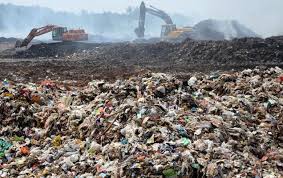
When the mafia acts like the state. Quantifying the (bad) effect of Italian organised crime on safe waste disposal
The phenomenon of organised crime in Italy is intrinsically connected with social development and is a powerful brake on institutional performance. The power of the organised crime lies in its involvement into seemingly legal activities and in the control exercised over entire economic sectors through systematic extortion and violence.
Since the early Nineties, southern regions in Italy have experienced chronic issues of illegal disposal of urban waste, mainly due to easy access to uncultivated land, presence of caves and sovereignty of mafiosi – to use a general definition that encompasses mafia, camorra, ‘ndrangheta and other networks. When combined with inherent weakness of local administrations that turn a blind eye to illicit trafficking of waste, this poses a serious threat to local welfare, health and agriculture.
In Italy, waste management is a public service funded by revenue from waste taxes. The operational part – collection, treatment and landfilling – is performed by private companies or subsidiaries, which compete in public tenders. The regional authority, via a regional commission, sets an average value for the price of landfilled waste, while local waste operators set site-specific gate fees. It follows that the waste operator gains higher profit from the combination of higher prices and larger quantities of treated waste. Net economic benefit from waste management depends on private costs of landfill establishment, operation, and health and environmental standards; hence it is not unreasonable to say that private costs are lower if the waste operator deviates to illegal disposal – an option offered by mafia.
This generates a loss of economic efficiency; the rent from waste management activities entirely accrues to criminal networks, which often infiltrate in the tender system and bid comparatively lower prices.
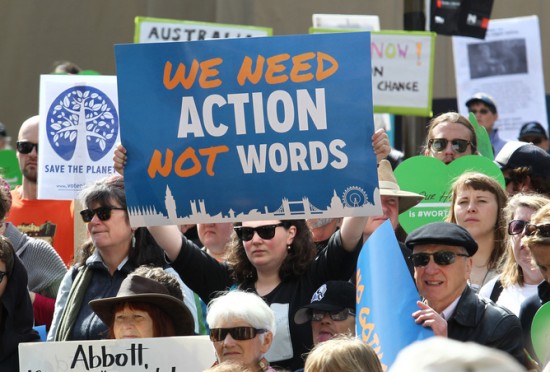
Doom and gloom won’t do it: here’s how to sell the climate change message
Each of the 125 leaders attending the New York climate summit last week has been given four minutes to speak to the world. They (or their aides) may well have dipped into the climate literature to add scientific ballast to their speeches. But they may not be as familiar with the vast array of academic studies on effective communication about climate change.
They should be. If world leaders and climate advocates really want to improve the chances of mobilising political will and citizen action behind a new deal, they will need to think carefully about what sort of key messages actually work.
Clearly there is a balance to strike between doom-ridden messages and “bright-side” opportunities, and uncertainties around the science and the expected effects of climate change must be factored in too. Can risk language help?

Rare-earth metals: anticipating the new battle for resources
Natural resources are pivotal in international politics. They create patterns of cooperation, dependencies and alter balances of power. The battle for resource is most commonly associated with energy resources such as oil and gas, or base metals indispensible for industries: aluminium, copper, lead, nickel and zinc.
In recent years, China has gained the reputation of a resource-avid country, pursuing deals for resource exploitation to its advantage. In numerous countries across Latin America, Asia or Africa, China has already established long-term deals with governments to obtain access to vital metals or resources.
In light of such narratives and records, a lesser-known fact about the geopolitics of resources has escaped public polemics. This refers to rare earth metals or rare-earth elements (REMs), a set of 17 naturally occurring non-toxic materials, which play a pivotal role for emerging technologies and which are predominantly produced and exported from China.Estimations of China`s hold on the REMs market are as high as 97% of the world production.
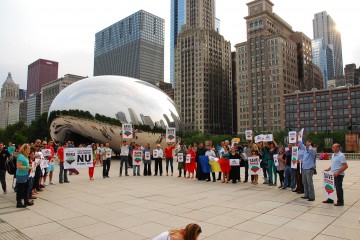
The European Commission is wrong about Romania’s Rosia Montana mining project
For the past seven weeks, Romanians have been leading one of the largest environmental protest movements in the world. Around 200,000 Romanians have taken to the streets in cities across Romania and the world to protest against the government’s recent approval of draft legislation for an open-pit cyanide-based mining project at Rosia Montana. According to Gabriel Resources Ltd., the Canadian company behind the scheme, the plan for the project is to dig up an estimated 314 tonnes of gold squirrelled away in Rosia Montana, using 40 tonnes of cyanide per day.
Despite the protests, the European Commission (EC) did not make a statement until only recently. The Commission’s response was prompted when Commissioner Janez Potocnik received a letter soliciting information on the EC’s intended actions regarding Romania’s moves to accelerate the authorization of the mining project, which would use environmentally dangerous cyanide leaching technology.
But a spokesperson representing the Commission emphasized that it was not concerned with the Rosia Montana project because it so far does not breach any EU environmental regulations. The spokesperson added that, as long as the Canadian company obtains its needed licenses, the project would be fine.
The Commission is wrong.
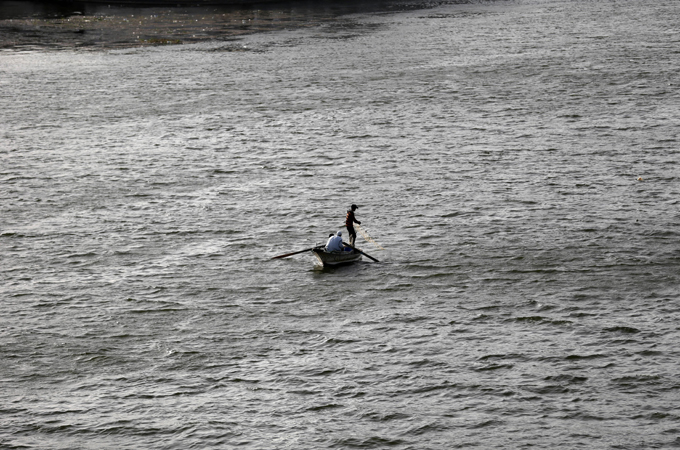
Why a ‘water war’ over the Nile River won’t happen
Is northeastern Africa heading for a bloody “water war” between its two most important countries, Egypt and Ethiopia? Judging by the rhetoric of the past two weeks, one could be forgiven for thinking so.
Ethiopia’s plans to build a multibillion dollar dam on the Nile River spurred Egyptian President Mohamed Morsi – whose country lies downstream from Ethiopia – to vow to protect Egypt’s water security at all costs. “As president of the republic, I confirm to you that all options are open,” he said on Monday. “If Egypt is the Nile’s gift, then the Nile is a gift to Egypt… If it diminishes by one drop, then our blood is the alternative.”
The following day Dina Mufti, Ethiopia’s foreign ministry spokesman, said that Ethiopia was “not intimidated by Egypt’s psychological warfare and won’t halt the dam’s construction, even for seconds”.
Morsi’s bellicose warnings followed the suggestions of leading Egyptian politicians on television last week that Cairo should prepare airstrikes and send special forces to uphold its God-given right to the lion’s share of Nile waters. The Ethiopian government of Prime Minister Hailemariam Desalegn has signalled that it is not impressed and that it will carry on with work on the multibillion dollar Great Ethiopian Renaissance Dam – a move seen by some as raising temperatures further, possibly triggering the “water wars” that pessimists have long predicted will characterise the geopolitics of the 21st century.

Toward a generative economy
“What kind of economy is consistent with living inside a living being?” This was a question posed under a leafy canopy, deep in the woods of southern England, not far from Schumacher College where I’d come as a teacher. I stood listening with a group of students as resident ecologist Stephan Harding asked what for me would become a pivotal question – the only question there is, really, as we negotiate the turn from the industrial age into a new age of civilization.
I’d come to Schumacher to share my learnings from four years as cofounder ofCorporation 20/20 at Tellus Institute in Boston, where I’d helped lead hundreds of experts in business, law, government, labor, and civil society to explore a critical question: How could corporations be redesigned to incorporate social and ecological aims as deeply as financial aims? Over 20 years as co-founder and publisher of Business Ethics magazine, I’d seen how corporations and financial markets had come to be the dominant institutions of society, how their profit-maximizing operating system had become the operating system of the planet. That design lay at the root of many major ills facing our society. But Stephan’s talk helped me understand why redesigning corporations did not quite hit the mark as the solution: You don’t start with the corporation and ask how to redesign it. You start with life, with human life and the life of the planet, and ask, how do we generate the conditions for life’s flourishing?
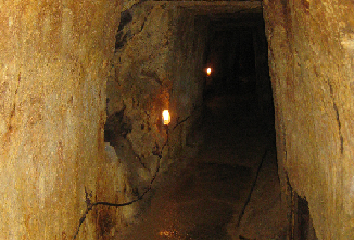
The Hypocrisy of the Romanian Government: Why the Rosia Montana project must be stopped.
Whilst in opposition, current Romanian Prime Minister Victor Ponta and his Social Liberal Union (USL), vehemently protested against the Rosia Montana mining project. Now they are in government, something appears to have changed their minds on the matter. The USL should remember that they are only in power as a result of the discontent of the population with the previous government, on issues that included Rosia Montana, and that they can be removed as well, if they fail in their duty to govern according to their mandate.









